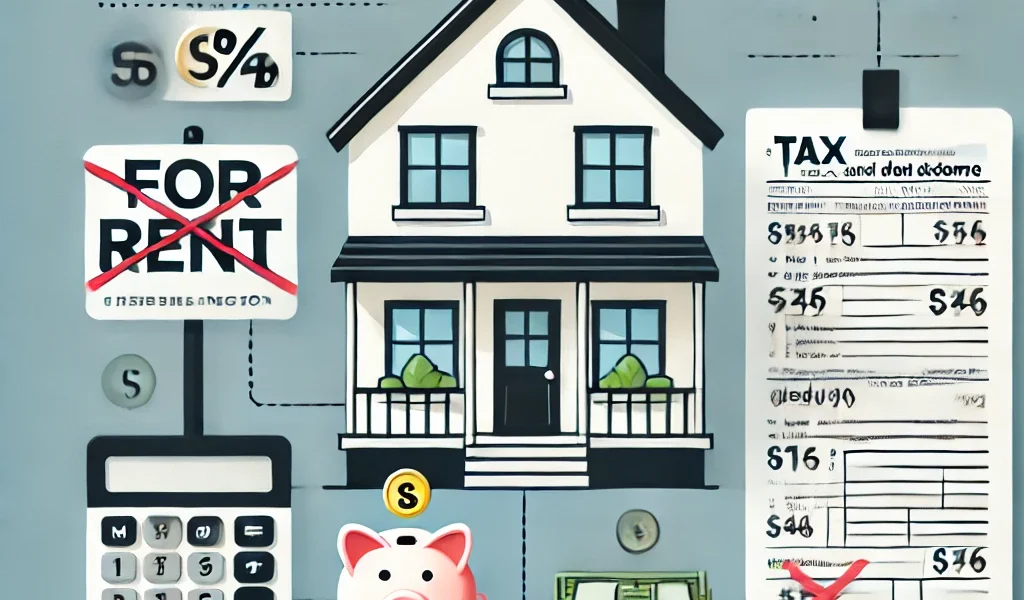Rental income is a great source of passive earnings, but it also comes with a tax liability. However, smart tax planning can help you minimize the taxes you owe on rental income while staying compliant with the law. This guide will walk you through legal strategies to reduce your tax burden and maximize your rental income.
1. Understand How Rental Income is Taxed
In most countries, rental income is considered taxable under the head “Income from House Property.” The tax is levied on the gross rental income received, minus allowable deductions.
Factors Affecting Rental Taxation
✅ Annual Rental Income: Total rent received in a year.
✅ Municipal Taxes: Property tax paid to the local authorities is deductible.
✅ Standard Deduction: A percentage of rental income allowed as a deduction for repairs and maintenance.
✅ Home Loan Interest Deduction: Interest paid on loans taken for property purchase is deductible under certain tax provisions.
2. Claim Deduction for Municipal Taxes Paid
Municipal taxes or property taxes paid to local authorities can be deducted from rental income before calculating taxable income. Ensure you keep records of all payments made.
Example: If your annual rental income is ₹5,00,000, and you pay ₹50,000 in municipal taxes, your net taxable rental income is ₹4,50,000.
3. Leverage the Standard Deduction for Repairs & Maintenance
Most tax laws allow a standard deduction on rental income to account for property repairs and maintenance.
Standard Deduction Rate:
✅ 30% of Net Rental Income is allowed as a deduction in many tax regimes.
✅ This deduction is applicable irrespective of actual repair expenses.
Example: If your taxable rental income is ₹4,50,000, the 30% standard deduction would be ₹1,35,000, reducing your taxable income to ₹3,15,000.
4. Deduct Interest on Home Loan
If you have taken a home loan to purchase the rental property, the interest paid on the loan can be claimed as a deduction.
✅ Deduction for interest paid on home loans under Section 24(b) of the Income Tax Act (India).
✅ No upper limit if the property is rented out (for some tax regimes).
✅ Principal repayment deduction under Section 80C (India).
Example: If you pay ₹2,00,000 as home loan interest, you can deduct this from your taxable rental income, further reducing your tax liability.
5. Joint Ownership for Tax Benefits
Owning a property jointly with a spouse or family member can help distribute rental income, reducing individual tax burdens.
✅ Rental income is divided as per ownership share, lowering individual tax liability.
✅ If co-owners have separate income sources, tax slabs can be utilized more effectively.
✅ Both co-owners can claim home loan interest deductions proportionally.
Example: If a rental income of ₹6,00,000 is split equally between two co-owners, each reports ₹3,00,000, potentially falling in a lower tax bracket.
6. Opt for Family Members as Co-owners or Tenants
If possible, transferring ownership to a lower-income earning family member can reduce the tax burden.
✅ Lower-income earners may fall in a lower tax bracket.
✅ Ensure transactions are legally documented to avoid legal scrutiny.
✅ Rent received from family members should be at market rates to comply with tax laws.
7. Claim Depreciation on Property (Where Applicable)
In some tax jurisdictions, property owners can claim depreciation as a deduction, reducing taxable rental income.
✅ Annual depreciation allows for property wear and tear deduction.
✅ The rate of depreciation depends on tax laws (typically 2.5%-5% per year).
✅ Commercial properties may have higher depreciation benefits.
8. Invest in Tax-Saving Bonds & Instruments
Investing rental income in tax-saving instruments can help reduce overall tax liability.
✅ Capital Gains Bonds (for reinvesting property sale proceeds).
✅ Tax-free municipal bonds.
✅ Retirement funds and pension schemes offering tax deductions.
9. Consider Renting Out as a Business Property
If your rental income comes from multiple properties, you may consider setting up a business entity.
✅ Business expenses like maintenance, advertising, and legal fees may be deductible.
✅ Certain business structures may enjoy lower tax rates.
✅ Corporate tax structures can offer additional benefits like GST input credits (if applicable).
10. Utilize HRA Exemption if You Pay Rent Elsewhere
If you are a salaried individual earning rental income but also paying rent for your residence, you can claim House Rent Allowance (HRA) exemption.
✅ Helps reduce taxable salary income while reporting rental earnings.
✅ Ensure valid rent receipts and rental agreements for compliance.
✅ HRA exemption is separate from rental income taxation.
Final Thoughts
Reducing tax liability on rental income requires careful planning and legal compliance. By leveraging deductions for municipal taxes, home loan interest, and standard depreciation, you can legally minimize your taxable income while maximizing earnings.
📌 Quick Recap of Tax-Saving Strategies for Rental Income:
✅ Deduct municipal taxes before calculating taxable income.
✅ Use the 30% standard deduction for maintenance & repairs.
✅ Claim home loan interest deduction under Section 24(b).
✅ Opt for joint ownership to distribute rental income and tax burden.
✅ Invest in tax-saving bonds and instruments for further deductions.




